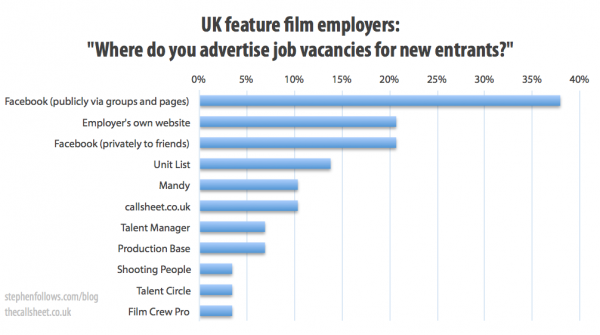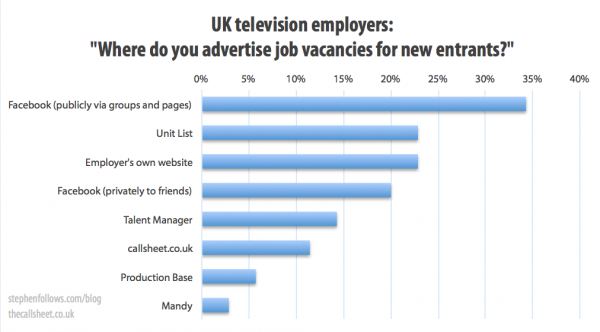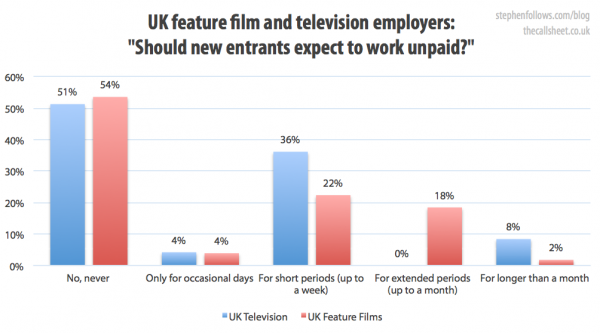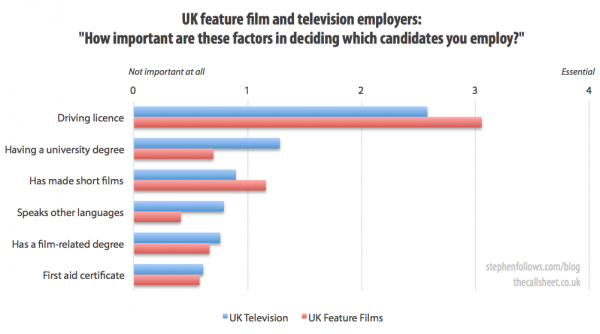 To many, working in the film and television industry can sound a little nutty. Many job advertisements seem to read… Compliant drone needed to work long hours for low pay under unpleasant conditions. Must be willing to drop everything at short notice in return for no job security, no pension and fewer than one lunch break per day. Must own a car and don’t bother applying unless you know someone who already works here.
To many, working in the film and television industry can sound a little nutty. Many job advertisements seem to read… Compliant drone needed to work long hours for low pay under unpleasant conditions. Must be willing to drop everything at short notice in return for no job security, no pension and fewer than one lunch break per day. Must own a car and don’t bother applying unless you know someone who already works here.
And yet there are no shortage of new entrants. The number of media students has increased dramatically in recent years and the UK film industry is employing more people than it has in a very long time, possibly ever. The end result is that most industry professionals get asked on a regular basis “How can I get into the film/TV industry?” ![]() To answer this I performed two surveys – one with 1,235 international film professionals and the other with thecallsheet.co.uk’s audience of UK television and film employers.
To answer this I performed two surveys – one with 1,235 international film professionals and the other with thecallsheet.co.uk’s audience of UK television and film employers.
In summary;
- Facebook is the most popular place for employers to post new vacancies
- Having a driving licence is much more useful than a university degree
- On average, UK employers receive 60 applications for each job.
- Only 46% of those applicants meet the job requirements
- Just under half of all film and television employers think that new entrants should work for free
- When asked ‘What makes a perfect CV?’ 67% of employers used the words “short” or “concise”
Where can I find a job in film / TV?
It would take a few blog posts to go through all the ways you could start your career in film or television so for now I will stick to the job boards. The most commonly used site for new film and TV jobs is… Facebook!

I have previously analysed a year’s worth of jobs on Shooting People, which would be worth reading if you’re looking for film work.

Should you work for free?
This is an age-old question in both the film and television industries. The short answer is that any unpaid work that’s not for a charity and which isn’t part of a full-time educational course is illegal. The minimum wage (currently £6.31 per hour plus holiday pay) applies to all workers in the UK. The two exceptions are for freelancers (which HMRC has decided cannot apply to entry level positions) and for voluntary positions (often called ‘interns’). Internships operate within very tight guidelines and the current guidance states…
Interns that are genuine volunteers, under no obligation to perform work or provide services. … However, if an organisation treats an intern as though he were a worker a contractual relationship may arise. To avoid this, a sponsor must ensure that the intern is not subject to any obligation to perform work or provide services and that regular payments are not made to the intern.
Unpaid work can be useful to learn how the industry works but there is a line that we should make sure employers don’t cross. In the past, both film and television employers have been successfully prosecuted in employment tribunals for not paying staff. It’s a complicated topic and it covers more than just salary concerns. In a recent case in the US, a television intern was denied protection from sexual harassment because she was not technically a worker. I asked my survey of UK-based film and television employers if new entrants should be willing to work for free. Over half said ‘no’.

How many people apply for each job?
On average, UK employers received 60 applications for each job. Whilst this may sound daunting for new entrants there is some good news: employers judged 46% of those applications as inappropriate (i.e. didn’t meet the job requirements). This means, if you’re applying for a job in film which you are actually qualified for then you’re already in the top half of applicants.
What skills do you need for UK-based work?
The very fact that you’re a new entrant means that you know little about the industry. Yet there is something you can study that will help you enormously. It’s not Media Studies, Film Production or TV Theory. It’s learning to drive.

Bear in mind that if you’re driving as a part of your job you should not be using your own vehicle. Your personal insurance is very unlikely to cover you for business uses so you’re effectively driving uninsured.
What about working in the international film business?
Unsurprisingly, if you want to work with the international film business, it will help if you speak other languages. But having a driving licence is, on average, more useful than having either a Masters degree, PHD or MBA! There, I’ve just saved you £63,072 (average cost of an MBA course minus driving lessons).

Working in or with non-English speaking countries makes knowing at least two languages almost essential. 
“Please describe the perfect CV…” for a job in film / TV
 I gave my UK film and television employers a chance to write about their perfect CV. The resulting collection of comments could be summed up in one word – short. 67% of all the people who chose to leave a comment used the word “short” or “concise”. The consensus seems to be a clear one-page CV without any extraneous information, tailored to the job you’re applying for. Below are all direct quotations from employers… CV Dos
I gave my UK film and television employers a chance to write about their perfect CV. The resulting collection of comments could be summed up in one word – short. 67% of all the people who chose to leave a comment used the word “short” or “concise”. The consensus seems to be a clear one-page CV without any extraneous information, tailored to the job you’re applying for. Below are all direct quotations from employers… CV Dos
- 1 page long
- Clearly laid out
- Concise
- Highlighting transferable skills, ability to lean and work hard
- Basic details (such as driving licence, age, contact details) easy to find
- Clearly stating relevant experience fist, then relevant skills
- Have details of referees.
CV Don’ts
- Not full of student work made to look like professional work
- No spelling mistakes/ grammar mistakes/ typos
- Leave out self-promotional waffle in the 3rd person.
- No white lies, which come out a lot quicker than people think
- Never include a ‘personal statement’ – ever
- No hobbies or ‘I’m a great time keeper’ rubbish
- No list of short films made at uni
Example responses
- I don’t care if you’ve been an assistant manager in Pizza Hut. I want to know that you can follow instructions, are polite and helpful and cheerful – even when knackered and under pressure. I want you to care about paperwork presentation. I want you to be totally anal about filing, emailing, checking, keeping distribution logs etc etc. I want you to run about providing busy more senior people with food and drink to keep them going. I want the kitchen to be spotless and I don’t want to be told that there was no bread or milk when people turn up for breakfast. I need to trust you implicitly.
- Name and job role at the top Profile paragraph Jobs listed with Month & Year / Production name / Company / Broadcaster / Role description in that order Referees / other at the bottom
- Clearly & uniformly laid out – including job titles, production companies, short descriptions of role, & rough length of time in each role. No grammatical or spelling errors.
- Don’t think there is one – it could be a word or a location that catches my eye. Or something else entirely unrelated to the role I am looking to fill.
What are the common mistakes you see newcomers making when trying to get work?
This question revealed a fair amount of frustration at the mistakes made by many applicants. I suggest that if you fall foul of any of the following list then your CV is destined to be junked.
- No knowledge of set etiquette and no driving licence
- Not wanting to do menial tasks
- Not researching who they’re meeting or the job
- Thinking they have more experience than they do and not recognising it’s an entry level job and an opportunity to learn.
- Applying for jobs above runner level because they believe they are already producers
- Poor grammar, poorly targeted applications (i.e. asking film people for TV jobs, asking locations people for AD jobs)
- Inflated sense of importance of the experience gained
- Waffly CVs or ones that say they’re a Director because they were Uni
- Not being specific in which role they are applying for & not telling me where they got my contact details from
- They don’t understand what the job actually entails.
- They allow their personal moods to affect how they behave at work.
- They are afraid of hard work and long hours.
- They think they are ‘above’ the job they are applying for and start (very inappropriately) trying to push their own opinions… (this happens a lot!!! particularly with people with a ‘film’ degree).
- Not taking the time to read the job description and applying with a generic covering letter (which is obvious to the employer).
- Spelling mistakes
- Not dressing and or brushing up appropriately for the Interview.
- Entering an interview/meeting with a lack of confidence… no matter how good the applicant is, if they speak as quietly as a mouse – they won’t leave a positive and lasting impression.
- Essay length cover notes
- They lie about their skills
- Lack of enthusiasm
- lack of research
What advice would you give to someone who wants a job in film?
This question was quite broad, so it solicited a wide range of responses. A few simply put “Don’t” but assuming that doesn’t put you off, here is a collection of advice from UK film and television employers…
- Driving licence with access to car
- Keep it simple and honest and be open to change and flexible
- Take all the opportunities that are given to you, show passion, research job roles and keep up to date with film and TV
- Don’t do a media degree
- Humility, and try to gain experience on the floor as a trainee runner to get acquainted to the etiquette and hierarchy on a real life film set.
- Don’t rush to move up the ladder before you know which ladder you want to climb – being a runner is your best chance to see what everyone does.
- Think about what an employer is going to be looking for on your CV & make sure it’s easy to find – relevant experience, driver’s licence etc. If you lack telly experience, show me how the experience you do have will help – eg waitressing helps learning to juggle lots of requests at once.
- Reach out to as many people as you can and keep in touch with those that show interest, updating them half way through each job to let them know when you are becoming available.
- Sign up to things like the thecallsheet.co.uk and IMDb Pro and know what is going on in your industry and who the key players are in all departments – knowledge is power!
- Call people. Do your research. Understand what the job actually is and structure your CV to show that you understand it and that you have the ability to do it. Don’t get above yourself and be resolutely cheerful and hardworking even when you don’t feel like it.
- Work for free and take any and all possible opportunities available to you. Just because you want to be a director now, doesn’t mean you won’t find a stronger passion for something else in the industry – don’t limit the experience you can receive in entry level positions. Be confident and be heard – but if you don’t understand or don’t know something, ask! It’s better to tell people you don’t know rather than guessing and possibly suffering dangerous/embarrassing consequences. Make Films! – You need to make films yourself to really SHOW who you are and what you’re capable of. Not only does it show others what you can do, it allows you to discover yourself too… (plus the obvious benefit of having material for showreels etc.)
- Must be persistent with sending out emails and CV to the industry, but must be in a professional manner (no calling mobile at 7pm in the evening) Try to get as much experience as possible, even working on short films, unpaid videos etc – that’s how I met people who eventually gave me a job!
- Enthusiasm is everything for a new entrant! You are unlikely to be taxed too greatly in terms of intellect in your entrant roles (this will come later in your career, I promise), but you will need to be upbeat & able to work on initiative – being positive and enthusiastic in an interview is the best way to demonstrate this.
- Learn to be attentive, remember what you have been told, we are only going to tell you twice if you are lucky.
- Be willing to muck in and do it all with a smile.
- Get experience in the professional environment as early as possible… this might be while you’re still at School/College/University, but the sooner the better. This may be unpaid work, so where possible, try and do it while you still live at home.
- Be yourself and smile. Persevere with CV sending – sometimes it can just be the right time when someone is looking.
- Be polite, be persistent, be patient, contact as many potential employers as possible, try to get work experience, shadow others in the area you want to work. Work hard, realise you’re starting at the bottom, smile and don’t give up
- Be fun, keen and humble
Epilogue
 I’m very grateful to Matt Gallagher from thecallsheet.co.uk for being so open to the idea and for pushing his members to fill in the survey. My thanks also goes out to the almost 1,300 people whose opinions made up the data and advice for this blog. I asked Matt for his thoughts on the results and he said…
I’m very grateful to Matt Gallagher from thecallsheet.co.uk for being so open to the idea and for pushing his members to fill in the survey. My thanks also goes out to the almost 1,300 people whose opinions made up the data and advice for this blog. I asked Matt for his thoughts on the results and he said…
Thanks to Stephen for compiling this survey and to our members for contributing to it. The results of the survey both support and echo the advice we offer our various blogs on thecallsheet.co.uk. I truly hope that the information about CV’s and applying for jobs is heeded as we see the same mistakes regularly. As part of our commitment to helping people get into the industry, thecallsheet.co.uk remains a free resource to new entrants and we only ever post jobs that meet the living wage.
 I also ran the results past Jude Winstanley, who runs The Unit List, which featured highly on the sites our employers used to post new entry level jobs. She said…
I also ran the results past Jude Winstanley, who runs The Unit List, which featured highly on the sites our employers used to post new entry level jobs. She said…
Thanks Stephen for publishing this very informative data. It’s a great boost to know that our hard work in providing a platform for bonafide jobs for professionals, is one that employers rate so highly. This is down to the incredible talent of all that use it appropriately, by applying for roles they are qualified for and working with us to constantly improve what we do at www.theunitlist.com However, I’m quite shocked and saddened at the employer survey results about working for free being acceptable, from almost half the respondents. We cannot allow a culture of unpaid work to be the norm. Apart from legal issues of unpaid work, If the industry can only be populated by those that can work for free, it turns it into a hobby. The talent will work in other industries that pay them a wage (it’s already happening) and then quality TV has no future. We must all (workers and employers alike) work harder to maintain a sustainable business model that allows everyone to make a career from our dynamic, creative and amazing industry. In practice, it’s really simple – don’t expect or advise new talent to work for free and we’ll retain them. If we already do this at www.theunitlist.com by declining to host unpaid jobs, you can help by choosing not to work for free. Can a survey next year achieve more positive results on this issue?
My two pence worth on this topic (and speaking as a film industry employer) is that most employers in the industry understand that new entrants will know very little about how things work. We are not expecting for you to perform miracles – we just want you to be keen, reliable, quick to learn, nice to be around and extremely hard-working. Everything else you can pick up as you go. Oh, and you have to be able to make an awesome cup of tea. Not good, not great but awesome. Tea makes the world go round.





Comments
Can I have a list of the best UK Film Industry Facebook pages?
Thanks,
Andrea
Good question. I didn’t ask the employees for a list but if any reader knows of any they can share them in these comments.
I know this one is rather good facebook.com/groups/tv.runners/
Quite shocking findings. It seems as though the industry leaders have placed themselves
on a pedestal and they are doing favors for new entrants. Passion and hope drives new entrants into this industry. When the industry wants to cash in on this for free it is just sowing the seeds of bad karma. Why the fear of knowledgeable entrants. We live in a technology driven world. Jude Winstanley seems the lone sane voice. These great industry needs to reinvent itself.
Dear Stephen,
this is a fantastic insight into the industry! Most of it doesn’t surprise me. I’ve been making a long transition as an actor/director from theatre into film and despite what people might think snobbish in some of the responses above I can only say that when you are with the right people, doing good work it is simply the best job in the world.
There’s a little reply in there I’d like to repeat because I think gets you further than anything else:
Always muck in.
This is an industry of craftsmen. Like any craft, experience will make you a better (Goldsmith, Carpenter) Filmmaker.
And now to scour some Facebook sites of film companies…
Chris
Stephen,
Thanks for compiling this information. Over here in L.A. I have to admit that entry-level job (and internship) descriptions sound exactly like your job advertisement except for “must own a car”. Most require that you provide your own transportation to and from work. And technically interns should not be driving at all because of the insurance issue you mentioned. In Southern California it seems having a car is a basic necessity. I’m curious, what’s the average percentage of people with a driver’s license and/or vehicle in the UK? What makes having a driver’s license so essential to the UK film and TV industry?
Thanks,
Jessica
Hi Stephen
Just to flag up the survey results are a little misleading as the vast majority of crewing done through http://www.thetalentmanager.co.uk is by companies searching for people – either within their private talent manager networks, or across the site generally – rather than by employers posting a job.
The whole aim of The Talent Manager is to encourage companies to plan ahead with their crewing – building networks of people they rate, or like the look of – rather than having to resort to last minute job postings on Facebook et al (though sometimes that is unavoidable.)
In terms of people wanting to get into the industry, one other tip is: watch TV! (Or film, if that’s your brand of vodka.) It’s extraordinary the number of people who apply for jobs without really watching any programmes (and, no, Big Brother doesn’t count unless you want to work for the company that makes it). And specifically, watch a production company’s output before writing to them saying you really want to work there! Why do you want to work there? What is it they do that you like?
Best
Matt
MD
DV Talent group (owner of http://www.thetalentmanager.co.uk )
Hello Stephen,
Thank you for the article it is insightful. Further to your blog I would like to ask the following; I currently have an auto car licence will this hinder progression from runner to 3rd AD?
Thank you for time
Jo
Glad you found it useful. Damn good question 🙂
There are two main scenarios where you’ll need to be able to drive – when you’re driving your own vehicle and when you’re given one by the production.
In the first case it’s about being about to get to locations/meetings/recces and transport people/kit/rushes. Therefore so long as you can drive your own car, it doesn’t matter.
In the second case, the production may rent vehicles and want you to drive on their behalf. Apparently under 20% of UK rental vehicles are automatic and (consequently) automatics tend to be a little more expensive.
I’d say that most 3rd ADs need cars for the first reason, certainly on larger productions. Smaller productions may be seeking people to be runner-driver-3rdADs and are more likely to penny pinch.
My personal feeling is that it won’t hold you back much, if at all. The difference between having and not having a license is huge whereas the difference between auto and manual is pretty small.
Hope that helps
Stephen
This is pretty interesting. I find Mandy.com doesn’t provide any well paid freelance jobs anymore as it’s transitioning into Film TV Pro (which is now requires a paid subscription). This is pretty much the same for the production base as well. I mainly use Facebook an Twitter to look for jobs now (using hashtag search or group search). Apart from that there are one or two other sites which provide the odd decent freelance film/tv jobs like the video collective (http://www.freelancevideocollective.com/) or even trawling indeed (http://indeed.co.uk/).
Anyway great article! 🙂
Great article Stephen. I’m surprised Linked in hasn’t been given more of a mention for finding TV work, been super effective for me so far! Also Dynamic Freelancers (https://www.dynamicfreelancers.co.uk/) is great for finding freelance TV work in London..
Hi love your posts! Know any good websites for PA jobs in the US?
Thank you so much for compiling this informative article. Still relevant 5 years later!
Personally, I volunteered for small projects with people I liked before I dove head first into making my first short, where people volunteered to help me and onward to joining IATSE 891 and making a career of film. Now, after 10 years of Chasing my passion for Film/TV I’ve moved across the globe (Vancouver, Canada to Singapore) taking the leap to rebuild my film community and find work I am passionate about. This article really spoke to me!
One point I would like to expand on for readers, is how relevant other work experience is to film. I held so many other jobs before getting into film and they all helped me grow in knowledge, know how and know why; Experience is experience. The people I work with in film have very different strengths and different reasons for being there; Some, only money, but they work hard for it. Others for the love of film, or tech, some the variety in each day. each of them have a role to play. If you over specialize, it breeds weakness. Bonus points if you know which anime character said that. Trevor Noah also spoke about this on ‘Chelsea’ the talkshow, look it up.
Also there is a difference in volunteering on a passion project or school related and working for free so someone/company can keep costs low and make money. Key is making sure you’re getting something out of it, and getting paid if they call again.
QUESTION: I found this article while searching for info on how film departments/roles differ from place to place. Any chance anyone has seen a concise article outlining such things?
Productionbase.co.uk is a SCAM, stay away from them. You have no chance to find something out of it and their refund policy is not available. They just want your money to give you fake hopes.